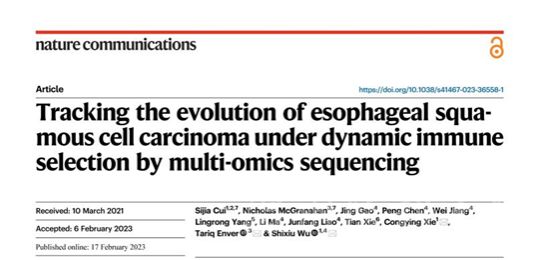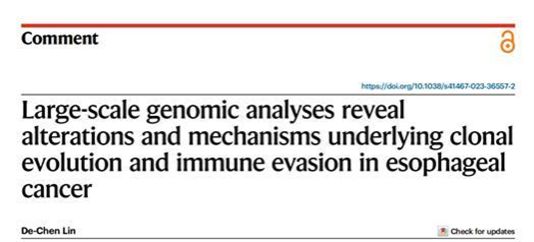- Blockbuster News! Oncology Discipline Group at the Second Affiliated Hospital of WMU Publishes Research Results in Nature Communications
- Author:2nd Affiliated Hospital Date:June 6, 2023
Recently, the team of Professor Wu Shixiu and Professor Xie Congying from the oncology discipline group of the Second Affiliated Hospital of WMU published a research paper titled “Tracking the evolution of esophageal squamous cell carcinoma under dynamic immune selection by multi-omics sequencing” in the international leading journal Nature Communications. The Second Affiliated Hospital of Wenzhou Medical University is the first affiliation unit of the paper.
This research paper was jointly completed by Tariq Enver's team of the Cancer Institute at University College London and the team led by Professor Wu Shixiu and Professor Xie Congying at the Second Affiliated Hospital and Yuying Children's Hospital of Wenzhou Medical University. Prof. Wu and Prof. Xie are the co-corresponding authors of the paper.

Esophageal squamous cell carcinoma (ESCC) is a common malignant tumor worldwide. Currently, the main challenges facing diagnosis and treatment are intra- and inter-tumoral tissue heterogeneity and molecular heterogeneity. Although many large-scale sequencing studies have established the genomic landscape of ESCC, predicting clinical survival of ESCC patients based on genetic or molecular features remains difficult.
In clinical practice, ESCC tumors are usually resistant to radiotherapy and chemotherapy, leading to poor overall prognosis of patients with a five-year survival rate of less than 20%. Therefore, it is of great significance to further explore the genomic information on ESCC to guide individualized treatment. This research found that ongoing chromosomal instability may cause genomic, epigenomic, and transcriptomic intratumoral heterogeneity (ITH). Different levels of immune infiltration in different regions of the same tumor revealed the genetic mechanisms of tumor antigen evasion under distinct selection pressure from the different immune microenvironments. This finding provides an avenue for dissecting the multi-omics level of ITH in ESCC, which drives breakthroughs in the clinical therapy for ESCC. In the same issue of the journal, Professor Lin at the University of Southern California published a comment on this paper, noting that the study has addressed several key issues at the genomic and epigenomic levels of esophageal cancer.

In recent years, the oncology discipline group of the Second Affiliated Hospital has achieved rapid development. With high-end instruments and equipment such as PET-CT, SPECT, linear accelerator, and breach-loading therapy machine, it has established the first radionuclide therapy ward and the first phase I clinical trial ward for oncology in southern Zhejiang, as well as several high-level research platforms such as the national clinical trial base for tumor drugs, the national standardized training base for radiation oncology, and the provincial engineering research center for technological innovation and application of intelligent radiotherapy.
Text translated by Jin Hongxi and reviewed by Sun You.
